Term Page
Enforcement
The ILRC has prepared free, downloadable signs to help you let your local communities know that you stand with them! Tell ICE that you are prepared to defend your guests, patrons, students, patients, or clients from unlawful entry or intimidation.
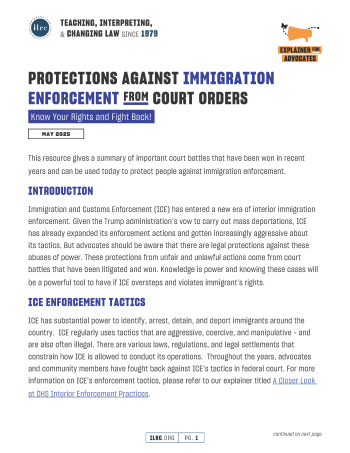
Given the Trump administration’s vow to carry out mass deportations, ICE has already expanded its enforcement actions and gotten increasingly aggressive about its tactics. But advocates should be aware that there are legal protections against these abuses of power. These protections from unfair and unlawful actions come from court battles that have been litigated and won. Knowledge is power and knowing these cases will be a powerful tool to have if ICE oversteps and violates immigrant’s rights.
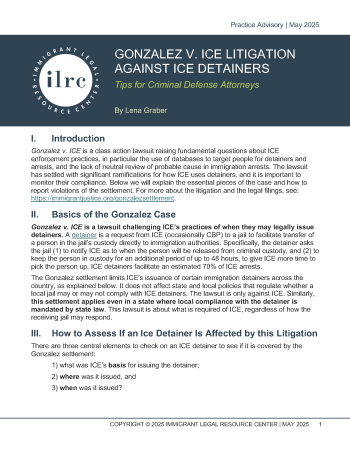
Step by step explanation for criminal defense counsel of how to identify ICE detainers that may be issued in violation of the Gonzalez v. ICE class action. This class action settlement applies nation-wide to limit ICE’s issuance of detainers. This advisory walks through the basics of the case and how to monitor and respond to any violations of the settlement.
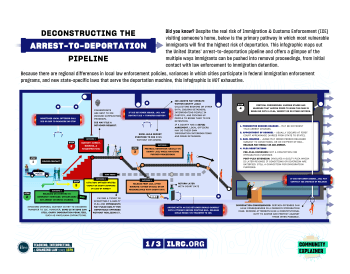
Despite the real risk of Immigration & Customs Enforcement (ICE) visiting someone’s home, below is the primary pathway in which most vulnerable immigrants will find the highest risk of deportation. This infographic maps out the United States’ arrest-to-deportation pipeline and offers a glimpse of the multiple ways immigrants can be pushed into removal proceedings, from initial contact with law enforcement to immigration detention. Because there are regional differences in local law enforcement policies, variances in which cities participate in federal immigration enforcement programs, and new state-specific laws that serve the deportation machine, this infographic is NOT exhaustive.
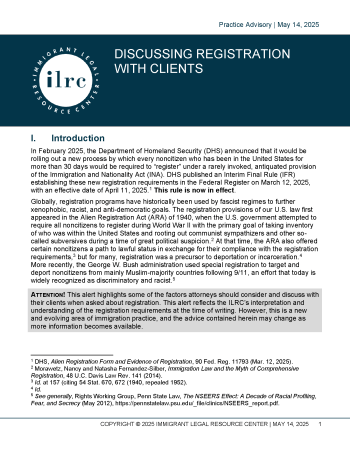
On April 11, 2025, the new Form G-325R took effect as a general tool to register all previously unregistered noncitizens under an antiquated and rarely invoked provision of the Immigration & Nationality Act, with criminal penalties for willful failure to register. This advisory was written to assist attorneys in discussing registration and the new Form G-325R with clients, including screening for prior registration and assessing the potential consequences of registering or not registering, so that individuals can make informed decisions about how to proceed in light of this new rule.
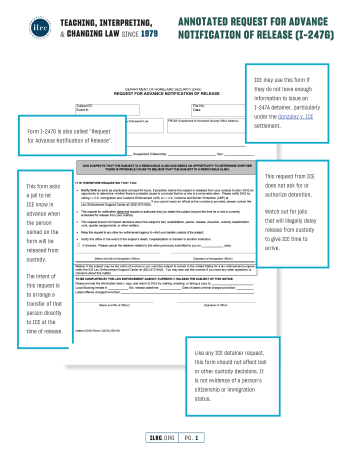
ICE’s form for requesting advance notice when someone will be released from custody. ICE uses this when they lack probable cause to issue a detainer, but want the jail to transfer the person to ICE custody anyway.
This resource compares immigration enforcement in Texas before Trump’s inauguration on January 20, 2025 with the policies Trump has instituted since he has taken office. Our analysis shows that Governor Abbott’s immigration enforcement policies led the way for Trump’s actions. Texas has served as experimentation grounds for hateful and sweeping immigration enforcement policies which were quickly adopted by Trump 2.0 for the national level and have also infected other states who have enacted Texas copycat laws and policies. Our analysis below is a mere snapshot of the Texas and federal immigration enforcement policies that are currently in place.

Tracking all the tactics this administration is deploying to target immigrants is overwhelming. In this document, we attempt to summarize some of the key ways the Trump administration is shifting policies and practices to surveil, arrest, detain, deport, and silence immigrants and the people who support them. We do not name every shift; rather, we focus on the weaponization of the criminal legal system, the increasingly authoritarian approach, and the role of the federal budget, which are key tools of the Trump administration’s brutality and also vital sites of advocacy needed to stem the tide.
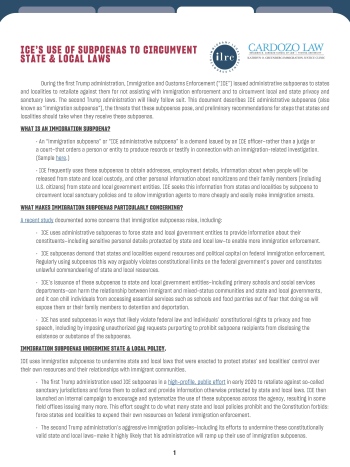
A primer on how ICE uses administrative subpoenas to circumvent local sanctuary laws, from the Benjamin N. Cardozo School of Law and ILRC. This brief explainer discusses the nature of ICE subpoenas, how they are used, and the legal issues involved.
Your green card is proof of your status. If you lose it or it expires, you are still a permanent resident. Permanent Residence is a status—only an immigration judge can take away your permanent residence. Permanent residents should carry their green card (or at a minimum a copy of it).